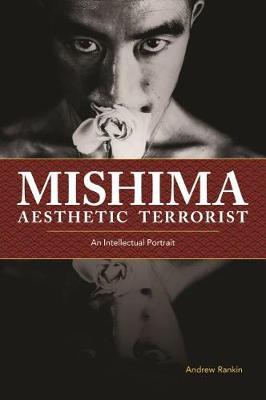Mishima, Aesthetic Terrorist: An Intellectual Portrait

Mishima, Aesthetic Terrorist: An Intellectual Portrait
Half a century after his shocking samurai-style suicide, Yukio Mishima (1925-1970) remains a deeply controversial figure. Though his writings and life-story continue to fascinate readers around the world, Mishima has often been scorned by scholars, who view him as a frivolous figure whose work expresses little more than his own morbid personality.
In Mishima, Aesthetic Terrorist, Andrew Rankin sets out to challenge this perception by demonstrating the intelligence and seriousness of Mishima's work and thought. Each chapter of the book examines one of the central ideas that Mishima develops in his writings: life as art, beauty as evil, culture as myth, eroticism as transgression, the artist as tragic hero, narcissism as the death drive. Along with fresh readings of major works of fiction such as The Temple of the Golden Pavilion and "Patriotism," the book introduces less familiar works in different genres. Special prominence is given to Mishima's essays, which contain some of his most brilliant writing. Mishima is concerned with such problems as the loss of certainties and absolute values that characterizes modernity, and the decline of strong identities in a world of increasing uniformity and globalization. In his cultural criticism Mishima makes an impassioned defense of free speech, and he rails against all forms of authoritarianism and censorship. Rankin reads Mishima's artistic project, up to and including his spectacular death, as a single, sustained lyric, an aggressive piece of performance art unfolding in multiple media. For all his rebellious energies, Mishima's work is suffused with a sense of ending--the end of art, the end of eroticism, the end of culture, the end of the world--and it is governed by a decadent aestheticism which holds that beautiful things radiate their most intense beauty on the cusp of their destruction. Erudite and authoritative, yet written in clear, accessible prose, Mishima, Aesthetic Terrorist is essential reading for all those who seek a deeper understanding of this radical and provocative figure.PRP: 123.94 Lei
Acesta este Prețul Recomandat de Producător. Prețul de vânzare al produsului este afișat mai jos.
99.15Lei
99.15Lei
123.94 LeiLivrare in 2-4 saptamani
Descrierea produsului
Half a century after his shocking samurai-style suicide, Yukio Mishima (1925-1970) remains a deeply controversial figure. Though his writings and life-story continue to fascinate readers around the world, Mishima has often been scorned by scholars, who view him as a frivolous figure whose work expresses little more than his own morbid personality.
In Mishima, Aesthetic Terrorist, Andrew Rankin sets out to challenge this perception by demonstrating the intelligence and seriousness of Mishima's work and thought. Each chapter of the book examines one of the central ideas that Mishima develops in his writings: life as art, beauty as evil, culture as myth, eroticism as transgression, the artist as tragic hero, narcissism as the death drive. Along with fresh readings of major works of fiction such as The Temple of the Golden Pavilion and "Patriotism," the book introduces less familiar works in different genres. Special prominence is given to Mishima's essays, which contain some of his most brilliant writing. Mishima is concerned with such problems as the loss of certainties and absolute values that characterizes modernity, and the decline of strong identities in a world of increasing uniformity and globalization. In his cultural criticism Mishima makes an impassioned defense of free speech, and he rails against all forms of authoritarianism and censorship. Rankin reads Mishima's artistic project, up to and including his spectacular death, as a single, sustained lyric, an aggressive piece of performance art unfolding in multiple media. For all his rebellious energies, Mishima's work is suffused with a sense of ending--the end of art, the end of eroticism, the end of culture, the end of the world--and it is governed by a decadent aestheticism which holds that beautiful things radiate their most intense beauty on the cusp of their destruction. Erudite and authoritative, yet written in clear, accessible prose, Mishima, Aesthetic Terrorist is essential reading for all those who seek a deeper understanding of this radical and provocative figure.Detaliile produsului










